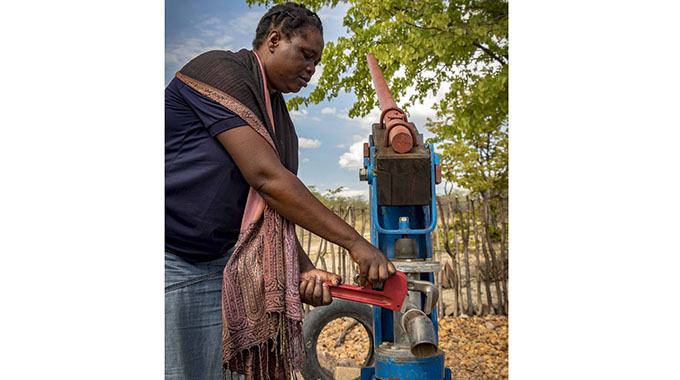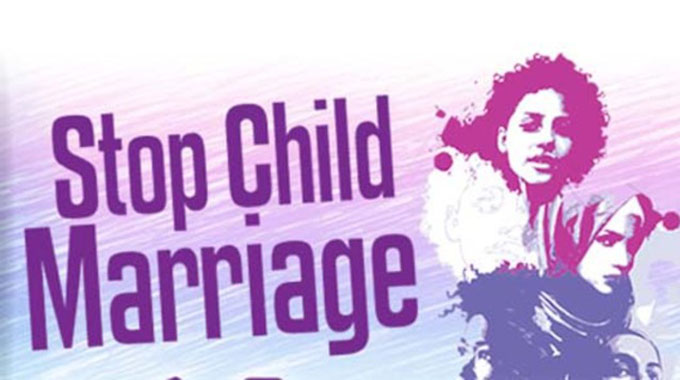Women lead in water infrastructure repair

Roselyne Sachiti Features Editor
A woman holding a toolbox walks towards Esikwakweni water point located a few metres from Mathuthu Village, under Chief Sibalo area in Insiza South, Matabeleland South Province.
From a distance, one can be forgiven for concluding that she is taking the toolbox either to her husband or to a male mechanic, but as she arrives at the borehole, her mission becomes clear.
She places her toolbox on the “blistering” hot ground, confidently moves around the borehole to inspect it.
In the toolbox are tools that include a pipe or stillson wrench, ring and combination spanners, several adjustable spanners, and a container of grease, among other items.
She repeatedly pumps until water finally comes out. She concludes the borehole has a low yield and is not broken down.
Her attention shifts to her main area of interest — the pump handle, spout and pump head. Today, the source of the problem is a loose bolt on the pump head.
Several parts of the pump head also need lubrication and she immediately gets down to business.
Just another day at work for Faith Moyo, a mother of five, who is a responder and works as the Ward 3 village pump caretaker for the Esikwakweni water point covered by the Rural Wash Information Management System SMS Notification Response (RWIMS.SNR), a programme piloted in Matabeleland South Province.
She works alongside several female village pump mechanics.
“I have been doing this work for a year now,” explains Moyo as she fastens one of the bolts.
“Whenever there are loose or missing bolts and screws on the top part of the borehole, the key informant (KI) sends a text message to Soneni Mpofu, who is the enumerator for this area.
“I then get an SMS and immediately attend to the water point.”
When doing her maintenance work, she updates Mpofu when a problem requires further expertise and a village pump mechanic and the District Development Fund (DDF) official are immediately informed.
“When the problem is bigger, maybe the pump cylinder which is underground needs attention, I inform Mpofu and village pump mechanic (VPM), who also immediately attends to it,” says Moyo.
“We have several female VPMs in this area.”
She says RWIMS.SNR has improved community cohesion and female participation in WASH programmes.
If anything, women and girls are empowered when they have control over the resources to meet their WASH needs and participate in the provision of WASH services.
Above all, investments in WASH contribute to reducing sexual and gender-based violence.
“When villagers see borehole repairs being done within a few days as a result of the effectiveness of RWIMS.SNR, they are eager to help with any information,” says Moyo.
“In the past, we would wait for up to three months to have our borehole repaired. We also now have a village water committee comprising seven members.
“If a borehole is broken down and the problem requires money, maybe to replace a missing bolt, we use funds collected by the village water committee. Each household contributes a dollar per month.”
The role she plays has helped her personally, and most importantly improved the livelihoods of the community.
Most importantly, WASH is a pillar of public health, a determining factor for nutrition outcomes.
“When I fix the borehole, I am paid for the work,” says Moyo.
“The money may be small, but I use it to buy exercise books for my children. With clean and safe drinking water close to our homes, women can grow vegetables and fruits in gardens, promoting a balanced diet.
“There are also some HIV positive people in our community who have benefited from RWIMS.SNR as when repairs are made early, they do not walk long distances in search of clean and safe drinking water.”
Moyo does not only check the borehole when she has received a report through RWIMS.SNR, she does routine checks every two weeks.
Each week she also applies a lubricant on the parts of the pump that require such.
But she points out RWIMS.SNR is the major contributor of their success.
It has helped them respond to timely information sent by enumerators like Mpofu.
Using a motorbike she received under the programme, Mpofu covers Wards 3 and 11. Young girls marvel at her and hope to be like her as she rides the motorcycle up and down the dust road leading to to various water points.
As the Ward 3 extension worker/enumerator, Mpofu is equipped with RWIMS FieldForce app on her tablet.
Ward 3 has 23 water points and as an enumerator, she also analyses, reviews, approves and effects updates from KIs, allowing such changes to be viewed in RWIMS Online.
RWIMS FieldForce is a tool for field data collection and mapping using smart phones.
It replaced the previous paper-based data collection system which was slow, to convey data to the central repository.
Because of RWIMS.SNR, Mpofu says she no longer travels to Ward 11, which is 15 kilometres away from her base, as the KIs there simply send the information and updates on water points to her on her tablet in real time.
“This saves me fuel and also time I spend travelling between the two wards to check if it is broken down or repaired,” Mpofu.
“In the past, I would visit Ward 11 two to three times a month and needed 30 litres of fuel.
“Now I am covering one ward per month and need between 15 and 20 litres of fuel. The KI sends me an SMS that will tell me if a borehole has been rehabilitated.”
Mpofu says being a user of RWIMS.SNR she has seen how it has contributed to sustained functionality of WASH facilities through timely information about breakdowns and patterns of usage that hamper functionality.
“The RWIMS.SNR has also cut down on time spent on repairing boreholes,” she says.
“When I need any information concerning WASH, I just download it from my tablet. Through RWIMS.SNR, information is always available, it’s on my fingertips.”
This, she explains, has improved hygiene in their community.
“It has also helped the community to manage water sources,” says Mpofu.
“It also encourages nutrition gardens and boost nutritional status of the community, especially children under five and pregnant women.”
The RWIMS.SNR being piloted in Matabeleland South Province is a platform used to send alerts to service providers to trigger operations and maintenance service response.
It connects users of WASH facilities at village level with operation and maintenance service providers via free SMS.
It is also used to communicate updates to RWIMS enumerators at ward level on any changes to the status of WASH facilities following breakdowns or repairs.
RWIMS.SNR is being undertaken by the Government of Zimbabwe with UNICEF’s support and funding. Other funding partners include DFID, Government of Switzerland through SDC and Government of Sweden.
Insiza has a population of 100 333 people, 967 communal water points, 199 schools, 14 health institutions and 304 villages.
Women play an important role in development and their participation in repair and maintenance of WASH infrastructure speaks volumes of Government and its development partners’ commitment towards gender equality.
Over the years, Government has prioritised gender equality in order to enhance women and youth participation in the development process, in line with the United Nations’ Sustainable Development Goal 5 which seeks to “Achieve Gender Equality and Empower all Women and Girls”.
Through the Transitional Stabilisation Programme (TSP), Government seeks to further foster integration of gender mainstreaming across all sectors, cognisant of gender equality as fundamental to achieving equitable, sustainable and inclusive socio-economic development.
In addition to the direct human health-related importance, WASH has a very strong association with economic development.
Estimates of the economic benefits from water and sanitation vary, but a 2012 study for the World Health Organisation (WHO) put the global economic return on spending on sanitation alone as US$5,5 for every US dollar invested. Hygiene and sanitation are among the most cost-effective public health interventions. The costs of treating diarrhoeal disease drain both national budgets and family finances.
In sub-Saharan Africa, UN-Water estimates that treating preventable infectious diarrhoea uses up 12 percent of the total health budget.
With the important role of maintaining the communal wells and boreholes, Moyo goes to bed each day happy that her community always has a functional water point.
She is always ready to wake up to a new text message requiring her to fix another problem anytime.
Feedback
Email [email protected]
Twitter @RoselyneSachiti










Comments